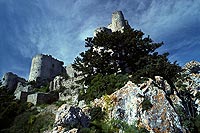
Kantara Castle in Famagusta, North Cyprus.
 |
the north cyprus travel guide |
 |
|
Kantara Castle, North Cyprus
Kantara Castle is the lowest of the three great Crusader castles of the Kyrenia mountains in North Cyprus, and the easiest to get to! Rather than being high in the mountains, Kantara Castle sits on a range of hills just at the neck of the Karpas Peninsula, not far off the new main road. Only 33 miles from Famagusta in North Cyprus, it is likely that the men who manned Kantara Castle originally came from Famagusta, rather than from Kyrenia. History of Kantara Castle, North CyprusKantara Castle first appears in records during the time of the Crusades of Richard the Lionheart. Indeed, it is said to be the castle where Isaac Komnenos surrendered to Richard in 1191. In 1228, Kantara Castle was besieged by royalists, who bombarded the walls with catapults so badly that they had to be almost completely rebuilt.
During the time of the Genoese attacks in Famagusta, Kantara Castle became a refuge for those escaping the fighting. (The prince of Antioch escaped from Famagusta to Kantara Castle with the help of his faithful cook!) In more peaceful times, the Lusignan kings themselves would come to Kantara Castle to hunt in the mountain forests, pursuing the local mountain goats with tame leopards. Like the other two castles in the Kyrenia Mountains (St Hilarion Castle and Buffavento Castle), the Venetians took over Kantara Castle, but abandoned it in 1525 because the castle was so remote. The ruins you can see today at Kantara Castle date from the 13th century, and the picturesque remains include towers, walls and a defensive barbican. The word "kantara" means arch in Arabic, and the castle is built on one, making the castle only accessible from one direction.
Visiting Kantara Castle, North CyprusAs you walk into the castle between the twin towers of Kantara Castle, it's not always clear what part of the castle was where, because it is spread over a rocky site. The hill summit rises up in the middle of the site, so one half of the castle lies over the other side, including the lining quarters and water cisterns. The medieval latrines are on the south walls, and use the castle's sophisticated water system. There are also barracks along this wall, and are in good condition with roofs and woodwork intact. (Local legend says the castle has 101 rooms, and anyone finding the last room enters paradise – on a one way ticket.) However, most visitors head straight for the northeast tower, where you can climb onto the roof hear and be rewarded with fabulous views. The Wonderful Views from Kantara Castle, North Cyprus
Probably the main reason to visit the castle are these amazing views, since you can stand and see both sides of North Cyprus at once! Looking north, the greenery of the olive groves and carab trees are in stark contrast with the dusty plains to the south, with Famagusta in the distance. Come on a clear day, and you should be able to see the Buffavento peak in the Kyrenia mountains some 30 miles away. Early in the morning on a clear day, you can also see the mountains of Turkey and sometimes, those in Lebanon too. It's a great reminder of just how close North Cyprus is to the lands of the Middle east, and why it was (or indeed is) so strategically important. The Lost Queen of Kantara Castle, North CyprusFrom the top of the watch tower, messages could be sent to Buffavento castle using a system of flares. However, locals claim that at night you can see a queen sitting in the Gothic window in the top of the one remaining wall of the tower, looking over her lost kingdom. In fact, the only person to live at the castle since it was abandoned by the Venetians 500 years ago was a hermit called Simeon, who lived here during the 19th century. Picnic at Kantara Castle, North CyprusKantara Castle makes a great day out for the family, but come prepared. The only refreshments available are at the Kantara restaurant in the village itself. Alternatively, stock up with a picnic in Famagusta and enjoy the picnic and barbecue sites available at the nearby forest station. |
|
North Cyprus quick: holidays | flights | hotels | property | kyrenia | famagusta | photos | map | weather | history | news
All text is copyrighted by Cyprus44. Photographs are copyrighted by their respective photographers.
For more information read our copyright policy, privacy policy and disclaimer.
This web page is served on 18 September 2025 at 10:37:27 AM.
![]()
Cyprus44 in other languages: Nordzypern | Chypre Nord | Severní Kypr | Северный Кипр
partner sites: goNorthCyprus Travel | Pacific Rent-A-Car | Amy Holiday Villas | other partner sites











